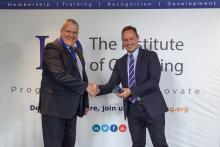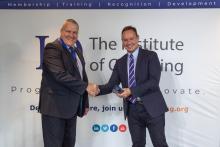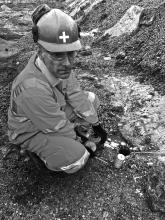
RSSThe UK-based Centre for Mineral Products Professional Development at the University of Derby has helped hundreds of students successfully complete prized industry-standard, globally recognised qualifications. And there are exciting plans to extend its ambitious programme. Guy Woodford reports.
Dominic Hodgson is excited about his future in the minerals extraction sector.
The 36-year-old from Derby has put in much hard work juggling his full-time job as a sand and gravel unit manager at
As he spoke to Aggregates Business Europe, Hodgson was waiting for the final results from his BSc (Hons) Minerals Management Degree, and to become one of the first graduates from the programme offered by the Centre for MPPD since January 2014.
“I’ve enjoyed it but also found it difficult, in the sense that it’s been a different level to what I’ve done before. It’s been a lot more about coming up with your own ideas and backing them up. “Hanson has been great and supported me. I was one of only three from the company put on the honours degree. The University has also been really supportive. They were learning, like me, as it’s been the first time they’ve done the honours degree, and they took a lot on board from what we were feeding back, such as on consistent structure of assignments.”
As part of his honours degree, Hodgson had to complete a specific work-based project. “Mine was to do with changing the process onsite,” he explains. “These were either equipment changes or procedural changes and looking at the impact they have on our key performance indicators (KPIs), such as looking at ways to save water, I also looked at our KPIs that we’re currently measured on and whether there were others more beneficial. Some of what I did centred on preventative maintenance, as one of our KPIs is about equipment availability, and some of my ideas are being looked at.”
Of his future career in the minerals extraction industry, Hodgson says: “I’d like to continue progressing and become an area manager. I think operations is where I feel comfortable, but I’d like to get involved in other sides of the business. I’ve always had an affinity to the engineering side.”
Based at the University of Derby’s Enterprise Centre, the Centre for MPPD offers industrystandard and endorsed study programmes and qualifications across five focus areas: Mineral Extraction (Quarries); Asphalt and Pavements (Road Construction); Concrete; Cement; and Heavy Clay (Brick & Pipe Manufacturing).
In partnership with the Institute of Quarrying, Institute of Asphalt Technology, The Concrete Society, International Clay Technology Association, and the Road Surface Treatments Association, the Centre currently offers 18 qualifications, ranging from a Bachelor of Science Honours degree (BSc Hons) in Minerals Management; Foundation Science degrees (FdSc) in Mineral Extractives Technology; Asphalt and Pavement Technology; Clay Technology; Concrete Technology; and Cement Technology; and a Higher Apprenticeship in Mineral Products Technology to University diplomas in Mineral Extractive Studies; Asphalt and Pavement Studies; Road Surface Treatments; Clay Studies; Concrete Studies; and Cement Studies; a University Certificate in Concrete Technology, and Certificates in Construction Materials, and Ready-Mixed Concrete Technology.
Launched in January 2014, the BSc (Hons) degree is designed as a potential two-year ‘top up’ for students that have completed either their three-year FdSc Foundation degrees in Mineral Extractives Technology or International Mineral Extractives Technology – twoyear FdSC degrees are offered to candidates with previous relevant qualifications – or a three-year Higher Apprenticeship in in Mineral Products Technology. Mark Osbaldeston, head of the Centre for MPPD, stresses that each BSc (Hons) degree candidate is assessed on an individual basis, so highly experienced candidates within the Mineral Products industry may still be able to do the degree.
Subjects covered in the BSc (Hons) programme include Leadership and operational management; Project management; Finance management; Commercial management and marketing; Extractives management; Lean structures; Quality management; and Health, safety and environment management. Students undertake a work-based project in order to apply everything they learn to an issue in their workplace, maximising the impact of their learning.
All University diplomas and certificates offered by the Centre for MPPD are studied over a single year.
More than 400 students have already completed the Centre’s Mineral Products or Extraction-based programmes.
The qualifications are delivered using blended learning, minimising the time spent away from work. It also means that industry-standard learning is applied in the workplace immediately. Osbaldeston stresses that the content of the qualifications is constantly reviewed to ensure it reflects the needs of industry.
“All the teaching material we cover on quarrying is owned by the Institute of Quarrying, and all the teaching material on road construction is owned by the Institute of Asphalt Technology. Both organisations keep the material up to date,” he explains.
“We’ve worked closely with Julian Smallshaw, the Education Officer at the Institute of Quarrying. He’d worked internationally in the Mineral Extraction sector and found there was very little like our offer elsewhere. With his help, we introduced an international version of our Foundation degree (FdSc International Mineral Extractives Technology) and the University Diploma (in International Mineral Extractive Studies).
“We’ve had several students in the USA, Australia, Eastern Europe, Middle East, Qatar and the UAE, and quite a few in Hong Kong and Malaysia. For them and other students, we can record learning sessions that they can refer to later on.”
Dannika Bannon, 28, from Chesterfield, is quarry manager at
“I’d like to go on and get a higher degree, but I think I’ll have to have a year or two off studies first.”
Regarding future ambitions within the mineral extractives industry, Bannon is aiming high: “There’s a man called Martin Riley [new Senior Vice President Tarmac] who’s just done really well in our company!”
Another Centre for MPPD student is Alaistair Charles-Clennell, from Derby, a lab technician in the R&D department at Aggregate Industries’ site in Hulland Ward, county Derbyshire. The 19-year-old is in the second year of his Higher Apprenticeship in Mineral Products Technology. “I’ve enjoyed getting to know the industry and my team at Aggregate Industries. Everyone’s been welcoming. The Higher Apprenticeship in this industry is a fairly new thing, and people are positive and trying to help me. If I ever have a question, people go above and beyond what I need to help. I don’t feel I’ve just been put in a job role. The director of my department and people in HR are keen to move me around the industry and expose me to as much as possible, which is good.”
Programmes in Quarry, and Asphalt Technology had previously been delivered at Doncaster College, where Osbaldeston, a former mechanical coal mining engineer, used to work.
“I left the ‘sharp end’ of the Mineral Products industry in 2005. I’ve worked in it all my life, initially at British Coal as a 16-year-old, but mostly with Hanson. After I left Hanson, I worked for the Institute of Quarrying delivering programmes at Doncaster College. The qualifications on the quarrying and asphalt technology side used to be known as DAPS – Doncaster Assisted Private Studies – which was a common term in the quarrying and asphalt industries. Around 1,800 people did their DAPS in quarrying.
“A lot of our major clients sending their students to us were saying they were getting a really good offer from us on the quarrying and asphalt technology side, but wondered if there was anything we could do on concrete and other areas. That’s when we started working with the Concrete Society and introduced concrete programmes.”
Keen to seek new partners and widen their offer, the Institute of Quarrying, the Institute of Asphalt Technology and the teaches you about everything within the [minerals extractives] industry. We’ve been on a study tour. I got to see loads. Brick making will always stick in my head now. We went up to Birtley [Birtley Brickworks, County Durham), to Ibstock Brick (county Leicestershire); and Tarmac’s Swinden Quarry [North Yorkshire]. They had a massive viewing platform there, helping to get the locals onside. It’s given me a few ideas.
“I’d like to go on and get a higher degree, but I think I’ll have to have a year or two off studies first.”
Regarding future ambitions within the mineral extractives industry, Bannon is aiming high: “There’s a man called Martin Riley [new Senior Vice President Tarmac] who’s just done really well in our company!”
Another Centre for MPPD student is Alaistair Charles-Clennell, from Derby, a lab technician in the R&D department at Aggregate Industries’ site in Hulland Ward, county Derbyshire. The 19-year-old is in the second year of his Higher Apprenticeship in Mineral Products Technology. “I’ve enjoyed getting to know the industry and my team at Aggregate Industries.
Everyone’s been welcoming. The Higher Apprenticeship in this industry is a fairly new thing, and people are positive and trying to help me. If I ever have a question, people go above and beyond what I need to help. I don’t feel I’ve just been put in a job role. The director of my department and people in HR are keen to move me around the industry and expose me to as much as possible, which is good.”
Programmes in Quarry, and Asphalt Technology had previously been delivered at Doncaster College, where Osbaldeston, a former mechanical coal mining engineer, used to work.
“I left the ‘sharp end’ of the Mineral Products industry in 2005. I’ve worked in it all my life, initially at British Coal as a 16-year-old, but mostly with Hanson. After I left Hanson, I worked for the Institute of Quarrying delivering programmes at Doncaster College. The qualifications on the quarrying and asphalt technology side used to be known as DAPS – Doncaster Assisted Private Studies – which was a common term in the quarrying and asphalt industries. Around 1,800 people did their DAPS in quarrying.
“A lot of our major clients sending their students to us were saying they were getting a really good offer from us on the quarrying and asphalt technology side, but wondered if there was anything we could do on concrete and other areas. That’s when we started working with the Concrete Society and introduced concrete programmes.”
Concrete Society began looking at other partners – moving all their programmes to the University of Derby in 2007.
Looking around The Enterprise Centre, where the Centre for MPPD is based, while talking to Aggregates Business Europe Osbaldeston continues: “This building was not here back in 2007. We were based at the University’s main campus, part of the Faculty of Education, Health and Science. Part of the move to the University of Derby was to raise the bar of the qualifications we could offer and make them nationally and then internationally accredited.
Quarrying had previously had more of a root in agriculture, in farming. Getting national accreditation, initially, was part of the quarrying industry getting on a professional footing.
“Around 2008/2009, the British Government realised there were issues with integration between industry and universities. . There was a glut of graduates in certain fields. There were then moves to engage more with industries to produce graduates that employers actually needed.
“The University of Derby and a number of other universities took up government funding to build more industry- related learning facilities, which led to The Enterprise Centre. The University’s Department of Quarrying and Asphalt Technology moved there in 2013 and changed its name to the Centre for Mineral Products Professional Development. That’s when we expanded the concrete offer further and introduced the clay and cement programmes.
“I think the more corporate feel of The Enterprise Centre suits our students, the vast majority of whom are already working in industry.”
Going forward, Osbaldeston says there’s still some mineral products sector education programme gaps that he would like to see filled. “There’s no direct access to us and the mineral products industry from GCSE level. There needs to be a college age level education programme where students could access the industry.
We currently only offer a BSc Honours degree in Minerals Management. It would be good to offer it in our other focus areas too. Beyond that, we’re looking to have Masters Degrees and PhD’s available from the Centre in the future.”
Due to retirements, Osbaldeston has been busy bringing in new lecturing talents for the Centre. “Three of my five new team members have PhDs related to mineral product subjects and the other two have vast experience in the industry, 35 years each,” he proudly notes.
Phil James, executive director at the Institute of Quarrying, is a keen supporter of the Centre for MPPD. “Our relationship with the University of Derby stretches out over the past decade, since the DAPS programmes – fondly remembered by many managers in our industry – transferred there from Doncaster College. Over that time, the various mineral products programmes have evolved into a robust set of accredited degrees and diplomas that provide excellent education and development to today’s Mineral Products professional.
“The Centre for Mineral Products Professional Development is central to the needs of our industry in developing highly skilled and knowledgeable people. It’s also a focal point – a shop window, if you will – that demonstrates the career options open to potential recruits, so that we are poised to attract and retain the best people. Recently, the Centre has built its team with the addition of five new high-calibre lecturers and programme leaders. Coupled with its close ties to a family of professional bodies, there’s simply nowhere better for delivering top-quality education and professional development programmes for our sector – anywhere in the world.”
For more information on the courses available at The Centre for Mineral Products Professional Development go to [email protected] or the website www.derby.ac.uk/minerals RSS










